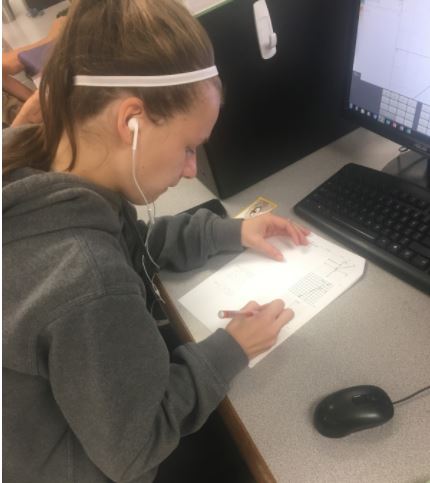Anxiety: Is School Helping or Hurting?

Working diligently on one of her many worksheets, Jasmine Hughes (‘20) uses her limited time wisely in study hall.
Multiple studies have proven that copious amounts of unnecessary stress have major effects on young people’s psyche. Researchers in a 2000 study conducted by the American Psychological Association, found that teenagers today have a higher stress level than insane asylum patients in the 1960’s. Is all of this true?
A 2012 study suggests that one in five teens qualify as clinically depressed. As a response, some schools have purged the AP program entirely. Beaver Country Day School in Massachusetts does not think that the inflated homework levels outweigh the heightened stress and mental health in students well being. Proof of such heightened stress can be found in our very own school.
“In one week, I missed three days of school for hockey, and it was stressful. I had missed 2 tests and 4 quizzes, not including homework. Making up homework took me about 7 hours, not including the work I had at school,” says Jasmine Hughes (‘20).
An educator professor at Missouri University in St. Louis composed a fitting analogy. “A good way to think about homework is the way you think about medications or dietary supplements,” he said. “If you take too little, they will have no effect. If you take too much, they can kill you. If you take the right amount, you will get better.”
For students with diagnosed anxiety, however, the stress and mental health issues are much greater. The Child Mind Institute’s article titled Anxiety in the Classroom claims “Anxiety tends to lock up the brain making school harder for kids.” In other words, having diagnosed anxiety dramatically affects these kids ability to learn.
As the article suggests, anxiety can begin a snowball effect. Preventing the person from completing an assignment, anxiety can lead to more work at home, which only worsens their anxiety and stress. Some experts say that the message ‘you can do anything or be anything you want to be once you grow up’ is also damaging. This lie has been implemented into everyone’s minds, but it could just be mounting someone up for extreme disappointment that could throw them into a pit of anxiety and depression.
“I feel like I can’t present if I’m not one of the first to go. I compare my presentation to others’, but I always have to present,” says Erin Davidson (‘20). Students with anxiety are only more pressured once they get into high school. The stress and anxiety can even increase when “I don’t know anybody, it’s a topic I’m not comfortable with, or if I’m not prepared.”
She compares her own presentation to others which is rarely a good thing, leading to heightened anxiety and stress about the situation. Anxiety negatively impacts students in every scenario, and it only grows when forced to do something uncomfortable. A possible option for teachers to help students could be to offer an alternative assignment for the same grade. Through this substitution, students can avoid the stress and anxiety of having to present.
There is certainly mounting evidence that homework and pressure to do well in school can lead to anxiety and mental health issues. One solution to this could be reducing or eliminating homework. With the issue in mind, Hughes expresses her concern, “I have on average four and a half to five hours of work per night. On a bad day, I have six. I feel like I’m not learning because of all the assignments I have to do. They give us so much work and not enough time to do it.”
As always, there will be people that disagree with the effects of school and homework on stress and anxiety. However, it may be best to ask someone who is experiencing the issue first hand.

